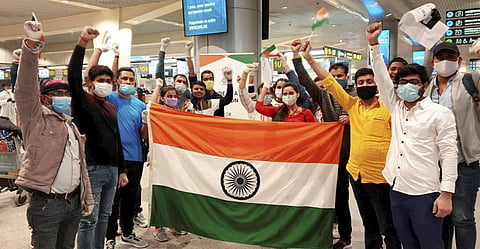

Everything has come to a standstill due to the coronavirus pandemic. There is no buzz of planes overhead, trains are not running, cars are not clogging arterial roads and human beings have stopped walking outdoors. The earth is breathing clean and healthy air. Pollution has reduced greatly and fresh air hidden behind a persistent smog has been set free. The waters in rivers are running clean, animals are fearlessly claiming their rightful place and nature is manifesting itself in its full glory—so much so that the snow-capped peaks of the Himalayas are now clearly visible from Jalandhar in Punjab.
Even if all this is for but a brief moment in time, it is a critical moment in human history and its memory will abide. For the first time in our lives, we have been allowed a glimpse of what might happen if the machines of human enterprise grind to a halt. But in order to truly understand the repercussions of halting the pace of development, one must first comprehend the fallouts of development.
Mr S K Chakraborty, in his article ‘Rising technology and falling ethics’, wrote, “The march of modern science and technology derived from it coincided with an era when the human race was beginning to snap its ties of personal-feeling-level relationship with earth and nature. ... From tool to machine to automation to chip, this progression seems to have made the human race increasingly less human.” This has happened due to a thoughtless increase in the speed of development and consumerism.
Now the pace has slowed, nature is being purified, and the individual is spending more time with family and loved ones. The warmth of close relationships and living a life of basic necessities has made people see that life can be lived in a way that is not dominated by consumption. One of the messages circulating on social media reads, “When you cannot go outside, go inside.” It brings to mind the essence of Bharatiya thought, “Not just outwards, travel inwards too.” That is not to say that there is no downside to the manner in which the world has come to a standstill. The economic wheel of the world has stopped, jobs have been lost, salaries are due and debts are mounting. People have had to leave the cities where they sought livelihood and return to villages. These circumstances present many conundrums and questions that confront a huge and diverse country like Bharat.
Author Billi Lim, in his book Dare to Fail, says, “When you face a problem and take yourself away from it, it becomes a situation. When you are to analyse it, it becomes a challenge. And when you think of your resources to meet the challenge, it becomes an opportunity.”
The traditional education system in Bharat has always encouraged innovation and a questioning spirit. Teachers taught students how to learn and how to lead life through their own conduct and example. Right now,education is being provided as a commercial enterprise for the sole purpose of teaching students how to earn money and amp up consumerism. As a result, we have been preparing self-centered and materialistic generations.
Because the yardstick to measure development and its direction has been urban-centric, all the basic facilities of roads, health, education, employment, etc., have remained city-centric. As a result, there was a migration of Bharat’s talent and intelligence from villages to cities, from cities to metros, and from metros to foreign lands. Therefore, villages are emptying out and the congestion in cities is increasing. Life in cities may be convenient, but it is run-of-the-mill, cut off from ground realities and ultimately hollow. And our development trajectory has left us with no option. Globalisation, which was imposed on developing and underdeveloped countries, is now revealing its adverse effects. The world is finally understanding that “globalisation” as it is being practiced is a new incarnation of “colonisation”—cleverly disguised to exploit developing and underdeveloped countries. Everyone is looking for a way out of this vicious cycle.So, now that things have come to a standstill and the whole world is worried about the new paradigm, can Bharat step up to pacify and reassure the world?
The answer is yes. Bharat, and only Bharat can do this, because only Bharat possesses the three qualities needed for this. One, only Bharat has more than 10,000 years experience of social and national life. Secondly, Bharat has a unique spirituality-based holistic and integral view of life and the lived experience of this world view. The modern sci-tech innovations have brought the world close together. So if humanity, with its ethnic, religious and linguistic diversity, has to live together complementing each other, preserving and celebrating diversity, it must turn to Bharat. W
e inherently believe in unity in diversity and live celebrating all aspects of human life, with controlled consumption. This is what the world has experienced with and observed about Bharat for ages. Bharat had achieved the pinnacle of material prosperity and in fact had the highest share in world trade for centuries. History has witnessed that for thousands of years, the people of Bharat used to go to different countries for business, but they did not attempt to build their colonies on these foreign lands to exploit the people there, nor did they try to enslave or convert them. Rather, they imparted culture and a better, civilised way of living life by their own living examples. This could happen due to our spirituality-based view of life that taught us to look at the entire world as one family, Vasudhaiva Kutumbakam. Wherever we went, we created wealth and spread prosperity.
This shows that Bharat has the vision, expertise and experience to shape a new world order.
Manmohan Vaidya
Joint General Secretary of the RSS